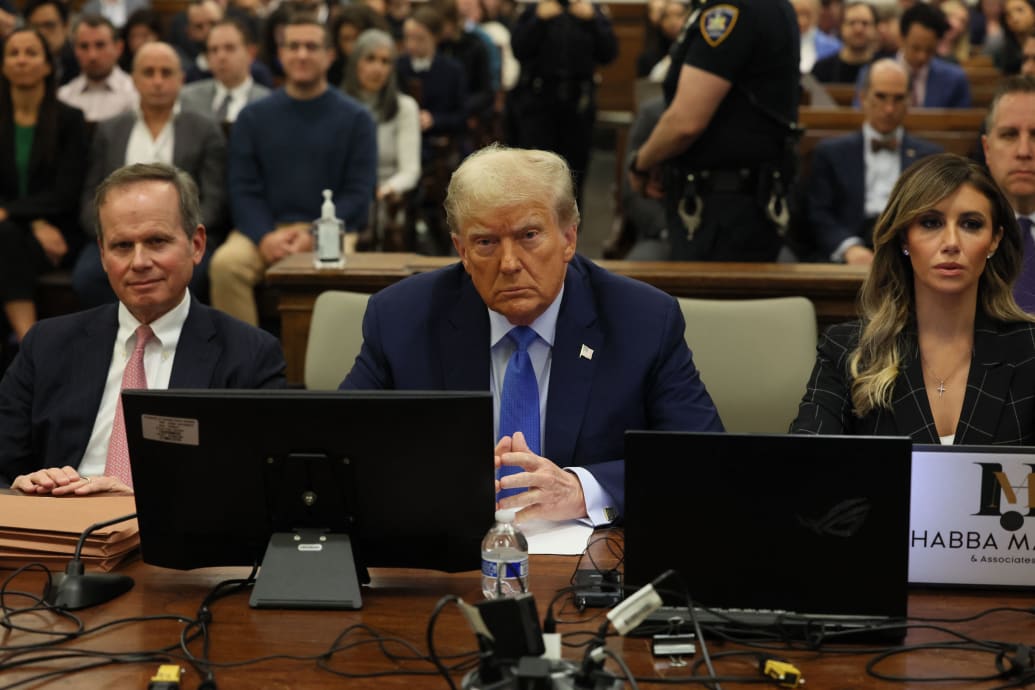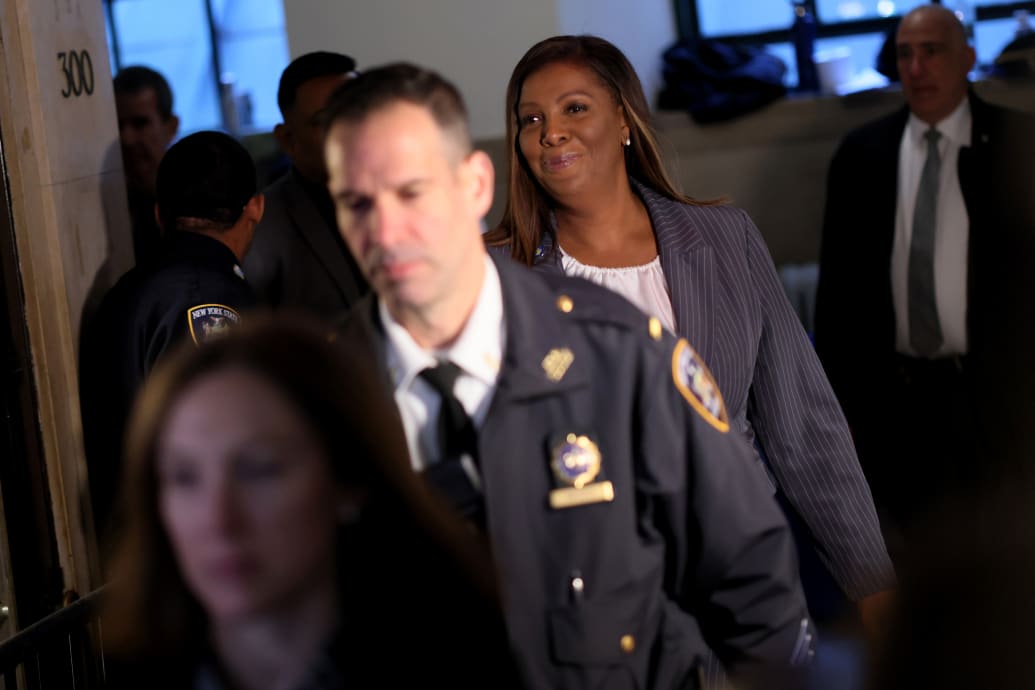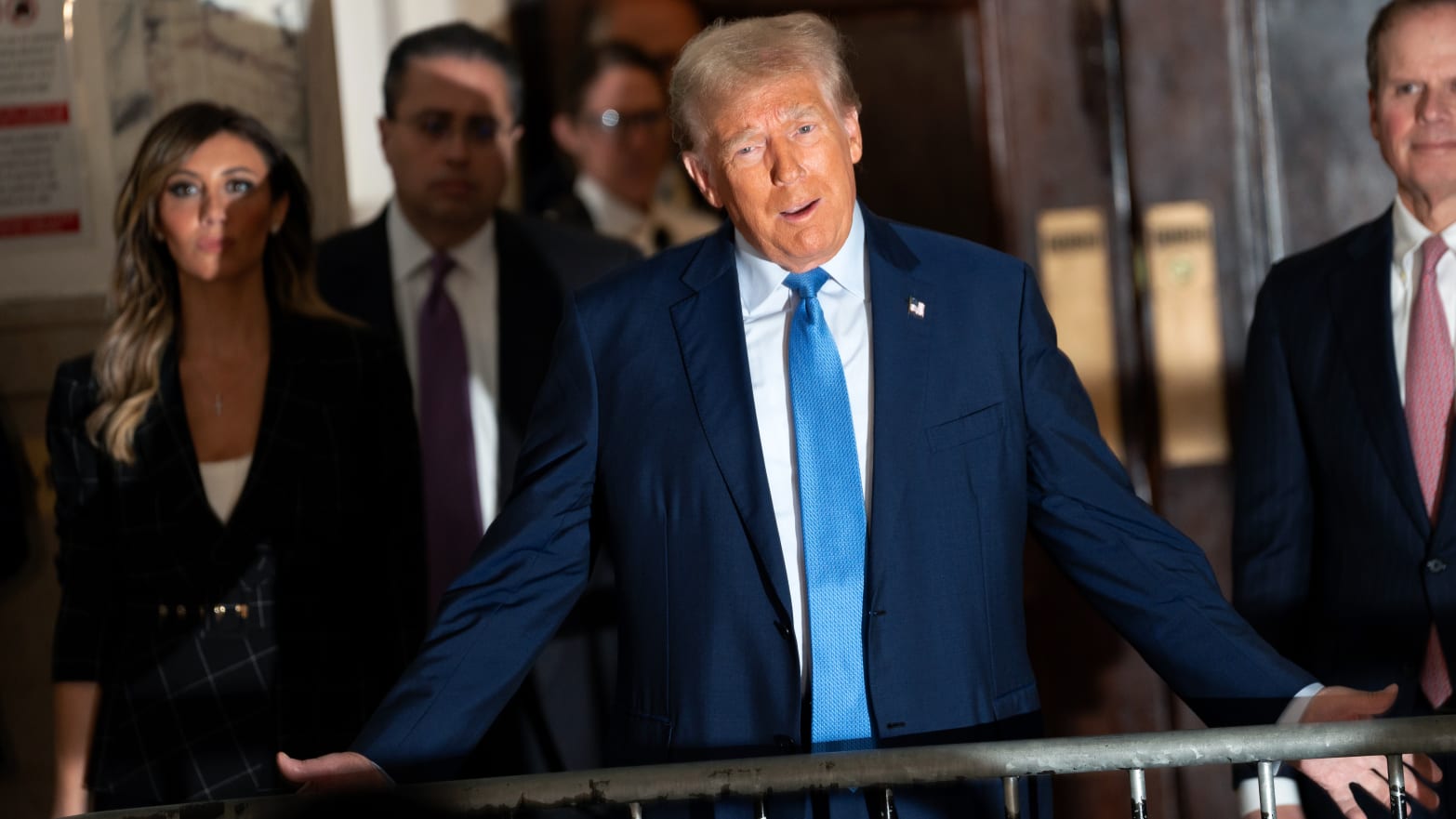When Donald Trump took the stand Monday in his $250 million fraud trial, the twice-impeached ex-president played all the hits. He was occasionally flustered, sometimes confused, often combative, and deflected any accusations whatsoever of wrongdoing, serving up boasts about his business acumen and real estate portfolio of what he described as the world’s finest properties.
Trump veered wildly off-script, insulted New York Attorney General Letitia James, demeaned the judge, whined that the trial was “very unfair,” and insisted that no one with money to lend should ever believe the Trump Organization’s own financial statements. Confronted with conflicting data in documents that seemed to point to inflated values of a New York City property, Trump dissembled before sulking, “This is so crazy.”
He also tested the judge’s patience from the get-go, drawing numerous rebukes for not answering yes-or-no questions with a simple “yes” or “no.”
“Mr. Kise, can you control your client?” Judge Arthur Engoron demanded of Trump’s lead lawyer just a few minutes into the meandering testimony. “This is not a political rally.”

Donald Trump pictured in court shortly before taking the stand on Monday.
BRENDAN MCDERMID/POOL/AFP via Getty
Surrounded by Secret Service agents, Trump sauntered into the already secure courtroom shortly after 10 a.m. Monday to face down prosecutors he has previously claimed are carrying out a “witch hunt,” a judge he has insisted is a “wacko,” and an attorney general he has called “corrupt.”
The case cuts to the core of Trump’s carefully crafted identity as a savvy titan of industry, which James says was built on lies. Engoron has already ruled that Trump committed repeated fraud in manipulating aspects of his company’s financial statements upward to gain advantageous rates on bank loans and insurance policies, and downward to lower his tax burden. This portion of the trial will determine what penalties he and his adult sons face.
On the stand, Trump quickly launched into complaints about “Democrat” prosecutors he described as “Trump haters.”
He then argued that the “worthless statement clause” contained in his financial statements, a disclaimer warning banks that they should not rely on the information provided by the Trump Organization, was all the cover he needed.
“These were not really documents that the banks pay much attention to,” Trump insisted. “They looked at the deal... but these were not very important. Primarily for the reason that you had a disclaimer clause.”
State attorney Kevin Wallace asked how Trump knew that banks didn’t pay much attention to statements of financial condition.
“Because I’ve been dealing with banks for 50 years,” Trump shot back. “I know what they look at.”
He claimed “the real values” for his properties, such as Mar-a-Lago, were far higher than what was on his financial statements, calling himself “more expert than anybody else” in the real estate game. He said “brand value” made his assets worth even more. (Engoron has already ruled that “the ‘worthless clause’ does not say what defendants say it says, does not rise to the level of an enforceable disclaimer, and cannot be used to insulate fraud as to facts peculiarly within defendants' knowledge, even vis-à-vis sophisticated recipients.”)
Trump’s testimony at one point rambled on so long, Engoron admonished him, “Please, just answer the questions. No speeches.” At another point, Trump couldn’t resist mentioning that he had $342 million in cash.
“It’s a lot of cash,” he said. “The banks came to me, they wanted to make deals with me, they like me very much.”
Engoron again asked Trump’s lawyer, Chris Kise, to rein in his client, noting that no one had asked Trump how much cash he had on hand.
Bringing up a document on the courtroom’s TV screen, prosecutors asked Trump if a section of his 2014 financial statement, concerning the value of a building he owns at 40 Wall Street, was accurate. Trump claimed his $550 million valuation was in fact a “low number,” before ranting about it being the “tallest building” in the area, except for the World Trade Center.
Engoron became irritated again, begging Kise to “control him.” But Kise argued that Trump’s testimony was “an unusual situation” and the court needed “to hear what he has to say about these statements.”
“We are not here to hear what he has to say,” Engoron replied. “We are here to listen to him answer questions.”
“Yes, you are here to listen to what he has to say,” Trump attorney Alina Habba interjected, to which Engoron snapped, “Sit down, already!”
Trump, looking on from the witness stand, bellyached, “This is a very unfair trial. Very, very unfair. And I hope the public is watching.”
At that point, Engoron ordered a 15-minute recess so Trump’s legal team could coach him on proper courtroom behavior.
Following the break, prosecutors asked Trump about the value of two buildings with which he owns 30 percent of in partnership with Vornado Realty. Trump bragged that he didn’t put up “any money,” and had “no liability,” as a limited partner.
“The question was, do you control the partnership?” the prosecution asked.
“In a true sense, no,” Trump said. “I will say this, we have a very good relationship—,” he added before being cut off once again by Engoron.
Prosecutors continued, asking if Trump believed the building’s stated value in his financials of $816 million was “based on true and accurate information?”
“I think so,” Trump said. “I hope so.”
He then claimed he was not involved in the preparation of the statement at issue, blaming Trump Organization executives. Don Jr. and Eric “were not involved very much at all, as I understand it,” he added. As for himself, “I was very busy in the White House, my threshold was China, Russia, and keeping our country safe,” he said, drawing derisive laughter from observers seated in the gallery.
Trump continued to argue that any numbers in his financial statements “that would be a little bit off, would be non-material.”
He reiterated that the statements included “a very important clause called the disclaimer clause… A lot of people call it a ‘worthless statement clause,’ they always hold up in court, except maybe this court. It says, very strongly, do your own work, do your own study… you can look at the statement but you must do your own analysis and due diligence.”
“And that’s why we shouldn’t be having a case here,” Trump thundered, claiming his point of view was accepted by everyone “except for this judge.”
He then turned on the prosecutor, loudly proclaiming, “People like you go around and try and demean me, and try and hurt me, probably for political reasons. In [AG James’] case, it’s definitely political reasons.”
If anything, Trump insisted, “I’m worth more than the numbers in this statement.”
The trial, he said, was “a political witch hunt” and James was a “political hack,” he fumed. “Even yesterday, she’s out there saying, ‘Fraud! Fraud!’ The fraud is her.”
Trump again tried to bring up the “disclaimer clause,” drawing another angry rebuke from Engoron.
“He called me a fraud and he didn’t know anything about me!” a peevish Trump shouted, pointing his finger at Engoron. “The fraud is on the court, not on me.”
After lunch, Trump came back with a head full of steam, repeating all of the same gripes he laid out in the morning.
“I’m gonna date myself, but this is sounding like a broken record,” Engoron sighed, as Trump continued to insist that there was no fraud and the banks all got their money back.
As is his wont, Trump again passed the buck and blamed the prosecutor. “He keeps asking me the same questions, your honor. The same questions, over and over,” he said.
Trump was done before 3:30 p.m., undercutting, by at least an hour, his complaint that prosecutors “want to keep me in this courthouse all day.”

New York Attorney General Letitia James arrives for the trial on Monday.
Michael M Santiago/Getty
James is seeking $250 million in damages, a ban on Donald, Don Jr., Eric, and Ivanka Trump from serving as officers of any company doing business in New York, and the cancellation of the Trump Organization’s business licenses.
In April, Trump was deposed by the AG’s office, and crowed that the government’s figures were not only wrong, but actually lower than his properties’ true worth.
“[Y]ou’re talking about numbers that have gone up in some cases many times,” he claimed at the time. “I mean, I won’t go into specifics now, because why should we give you early warnings. But when we testify, we’re going to have numbers that are going to knock your socks off. The numbers are very—your numbers are so incorrect. They’re actually so low, your numbers.”
Engoron was not at all convinced, writing in a Sept. 26 decision that Trump’s company was not at all on the up-and-up, and that Trump himself only made things worse with his “continued reliance on bogus arguments.”
“In defendants’ world: rent regulated apartments are worth the same as unregulated apartments; restricted land is worth the same as unrestricted land; restrictions can evaporate into thin air; a disclaimer by one party casting responsibility on another party exonerates the other party’s lies,” Engoron wrote. “That is a fantasy world, not the real world.”
As The Daily Beast recently reported, Manhattan prosecutors considered bringing criminal racketeering charges against Trump, essentially painting the real estate developer-turned-reality TV star’s business practices as no different from that of a mob boss.
Trump’s adult sons Don Jr. and Eric testified last week, delivering performances on the stand many found less-than-convincing. Both men claimed they simply signed off on paperwork drawn up by Trump Org. accountants, blaming others entirely for any wrongdoing.

